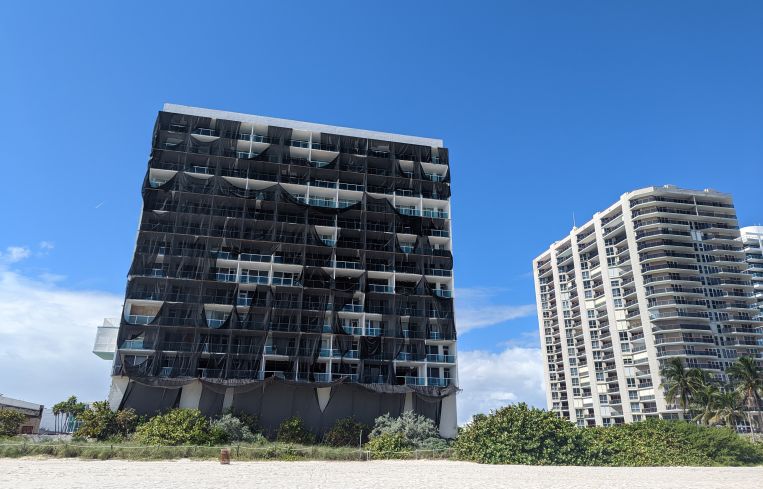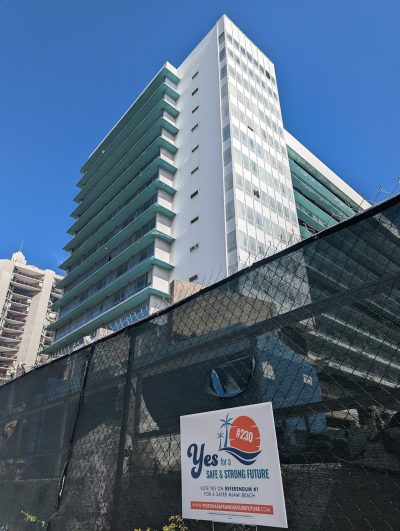The Miami Beach Real Estate Initiatives on the Ballot This November
Projects from Stephen Ross, Don Peebles and Barry Sternlicht are up for a vote
By Julia Echikson November 3, 2022 8:30 am
reprints
Real estate is playing a major role in the upcoming midterm election on Tuesday, Nov. 8, thanks to a slew of ballot initiatives involving real estate developments in Miami and Miami Beach.
The Deauville Beach Resort (Miami Beach)
The highest-profile referendum involves Stephen Ross’ plan to redevelop Miami Beach’s historic Deauville Beach Resort into an Equinox-branded condo and hotel property. Built in 1957, the MiMo-style hotel helped put The Beatles on the map, serving as the backdrop of their iconic “The Ed Sullivan Show” performance in the early 1960s.
But the property has been closed since an electrical fire in 2017, and it fell into such disrepair that a Miami Beach official deemed the resort structurally unsafe and ordered it to be knocked down last January. A Miami-Dade circuit judge later upheld the order, and demolition is scheduled for Nov. 13.
As preparation for demolition got underway, Ross swooped in, offering to buy the oceanfront property in May — if he could redevelop it. With his New York-based development firm Related Companies, Ross wants to build a luxury two-tower complex with 125 condos and 175 hotel rooms, designed by world-renowned architect Frank Gehry.
Miami Beach residents will decide whether to approve an increase in floor-area ratio, a method of regulating a building’s size, for the Deauville lot at 6701 Collins Avenue and two adjacent parcels. The move would allow Ross to develop a 375-foot tall tower, up from the 200 feet currently allowed. In return, the property’s allowed density will be reduced by 50 percent, and Ross will provide public beach access and a public recreational facility on site, the details of which have not been released.
For Ross, who partly grew up in Miami Beach and is now the owner of the Miami Dolphins NFL team, the development is a passion project. “As a native of Miami Beach, this project is personal to me. I know what this site means to the people of Miami Beach,” Ross said when announcing his purchase bid in May.

The developer, a major Republican donor, has also shelled out cash to get his way. An entity tied to Related contributed over $1 million dollars to a political action committee supporting Ross’ endeavor, some of which was spent on digital ads.
Miami Beach residents can vote yes on referendum 1 to approve the increase, or no to block it.
The Lincoln Road offices (Miami Beach)
Another referendum involves two office projects further south in Miami Beach, near Lincoln Road. Prominent developers Don Peebles and Barry Sternlicht’s Starwood Capital Group want to build competing office projects near the pedestrian mall and cash in on the island-town office craze. Miami Beach is sprouting boutique office projects — Michael Shvo has three in the pipeline; former Google CEO Eric Schmidt is backing another — thanks in part to the billionaire migration during the pandemic.
Starwood Capital Group, which moved its headquarters to Miami Beach in 2018 and completed its headquarters on the island last year, is seeking to build two mixed-use buildings, at 1688 Lenox Avenue and 1080 Lincoln Lane North on parking lots owned by the city. Starwood is working with partners Integra Investments and The Comras Company, both of which are based in the Miami area.
Their proposed development, up to 100 feet tall, would feature office space, ground-floor retail (including 1,000 square feet leased to a nonprofit rent-free) and a public parking lot to replace the existing surface lot.
On Ballot Question 6, voters will decide whether to greenlight the mixed-use projects by agreeing to a 99-year ground lease for the 0.86-acre site, which is expected to bring in at least $210 million in revenue for the city.
Just three blocks east, at 1664 Meridian Avenue, Peebles is seeking approval for a similar development, along with two partners, local developer Scott Robins and former Miami Beach Mayor Philip Levine. The six-story building would include Class A office space, 43 market-rate residential apartments, ground-floor retail space, and public parking to replace the existing 151 spots.
Like Starwood, the developers seek a 99-year ground lease for the 0.4-acre parcel, which is expected to rake in $145 million for the City of Miami Beach. Voters can approve or block the project by voting on Ballot Question 5.
Miami Beach residents will also get to decide how to spend the rent revenue collected from the two proposed office projects, estimated to total $355 million over 99 years. Ballot Question 4 asks voters whether the funds, divided equally, should go toward “resiliency and sustainability infrastructure initiatives, workforce housing, and public safety and prime prevention measures” without providing details.
Hotel-to-resi makeover in South of Fifth (Miami Beach)
Down south in Miami Beach’s South of Fifth neighborhood, two initiatives are designed to help turn Miami Beach from a party town into a more tranquil residential neighborhood and business district — an overhaul that Miami Beach Mayor Dan Gelber has campaigned for.
The city is proposing to boost the floor-area ratio for oceanfront hotels wishing to convert to residential buildings, from 2.0 to 2.75. If approved, the 11-story Marriott Stanton, at 161 Ocean Drive, would likely undergo such a conversion.
For properties east of Washington Avenue between First and Second streets, another ballot measure is asking whether to increase the floor-area ratio from 1.0 to 2.0 and 2.0 to 2.7 for certain residential and office buildings if the owner agrees to prohibit hotels and short-term rentals on the property.
The last referendum related to real estate in Miami Beach, Ballot Question 3, asks voters whether the municipality should seek voter approval before selling or leasing city-owned properties for over 10 years. The measure would affect properties between West 43rd Street and West 40th Street, and from Pine Tree Drive on the east to Alton Road on the west.
Across the bay, another potential teardown (Miami)
Like Ross, hotel builders want to tear down a prominent structure and redevelop the land in Downtown Miami along the Miami River.
For Miami’s only referendum, Hyatt Hotels and Miami-based developer Gencom are seeking to knock down the James L. Knight Center and the existing Hyatt hotel at 400 SE Second Avenue to make space for three skyscrapers, which will include 1,542 rental apartments in total, along with 615 rooms and 264 serviced apartments.
Because the properties sit on city-owned land, the developers are asking residents to extend the ground lease for another 99 years, which they say will allow them to secure financing for the project. If approved, the annual rent would jump from $250,000 to at least $2.5 million. The joint venture has also vowed to make a $25 million contribution to affordable housing initiatives, the details of which have not yet been released.
The proposal mirrors that of Riverside Wharf, a mixed-use entertainment complex along the Miami River. Voters approved a 50-year lease extension in August.
Julia Echikson can be reached at jechikson@commercialobserver.com.



